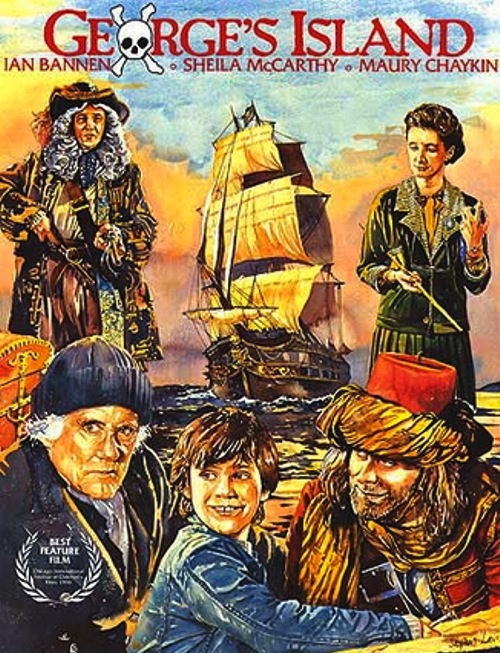Friday, March 29, 1991.
GEORGE'S ISLAND. Co-written and produced by Maura O'Connell. Music by Marty Simon. Co-written and directed by Paul Donovan. Running time: 90 minutes. General entertainment with the B.C. Classifier's warning: occasional violence.
GEORGE'S ISLAND, a tree-covered rock in Halifax harbour, was named for England's George III. So says fifth-grade teacher Cloaka Birdwood (Sheila McCarthy).
Not so, says retired sea captain Archie Waters (Ian Bannen). The name recalls an unfortunate member of Captain Kidd's crew, one George Jellybee (Gary Vermeir).
On a foggy All Hallow's Eve in the year of Our Lord 1733, Kidd (Gary Reineke) put ashore there with five crewmen to bury a chest full of pirate gold. "Who'll volunteer to guard the treasure?" he said.
Young Jellybee stood forward, not realizing that tradition demanded that the guardian rest alongside the bloodstained booty, his head separate from his body.
It's a "serious ghost story of serious and dangerous ghosts," the crippled Captain Waters tells his orphaned 10-year-old grandson George (Nathaniel Mareau, last seen absorbing Manitoba prairie lore from "grandpa" Gerald Parkes in The Last Winter).
It's evidence that pensioner Waters is a poor influence for a growing boy, concludes Miss Birdwood. Steps must be taken to find the child a "proper" home.
There's no arguing with writer-director Paul Donovan's sentiments. "Hollywood," say's the Haligonian film-maker, "isn't making the 1950s-style films I grew up with. There are . . . no more films that operate well on two levels — for children and adults."
Opinions may differ about the results, though. A worthwhile Canadian initiative, George's Island was named Best Feature at 1990's Chicago International Festival of Children's Films.
That said, Donovan's adventure fantasy remains an uneven blend of traditional Disney-style live-action comedy and John Bellairs shocks. The director responsible for the low-budget post-holocaust thriller Def Con 4 (1984) and the CBC docudrama The Squamish Five (1987), Donovan is at his best evoking period violence.
The decapitation of young Jellybee is explicit, something of a surprise in a film designed for a pre-teen audience.
Donovan is less assured with comedy. His film's adult characters — a group that includes McCarthy's shrewish schoolteacher, Maury (Dances with Wolves) Chaykin's immature Children's Services administrator Maynard Droonfield, and Brian Downey and Irene Hogan as the foster-parents-from-hell, Roger and Beulah Beane — are all cheap-shot cartoon figures.
Like the current Teenage Mutant Ninja Turtles feature, Donovan's film may appeal to undemanding kids. Neither film reaches that second level, though — entertainment for the accompanying adult.
The above is a restored version of a Province review by Michael Walsh originally published in 1989. For additional information on this archived material, please visit my FAQ.
AFTERWORD: George's Island, in common with most independent Canadian pictures, was produced with the financial assistance of Telefilm Canada, the federal agency founded to foster a domestic feature film industry. Although there were producers on both coasts eager to participate in this creative adventure, Telefilm's first loyalty was to Central Canada: Ontario (English) and Quebec (French). Based in Halifax, producer-director Paul Donovan found the experience of dealing with the government bureaucracy an inspiring one. In 1991, he published Paint Cans, a satirical novel set in Toronto and Cannes, that told the story of the "Film Financing Agency of Canada." Three years later, he adapted his book into a feature film, one that did not benefit from Telefilm participation.
HALLOWE'EN 2013: Hocus Pocus (1993); E.T. The Extra-Terrestrial (1982); The Nightmare Before Christmas (1993).
